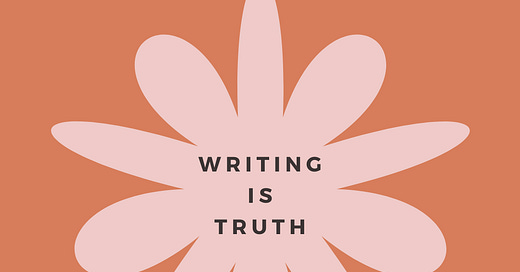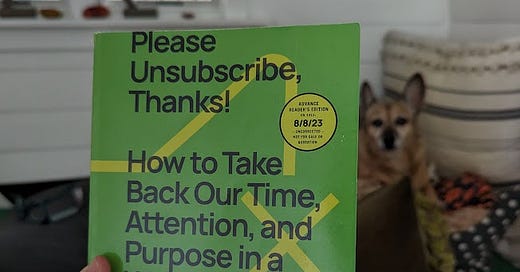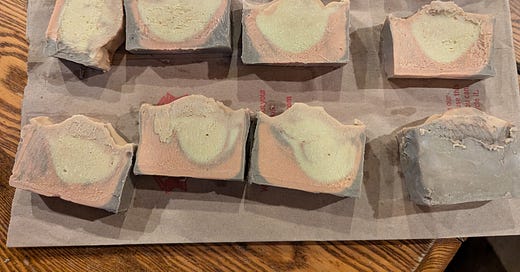
Discover more from Do the Work
Get Strange and Specific
Rick the Rock of Room 214 comes out in 30 days, so prepare yourself for more frequent newsletters this month, in the customary authorial practice of reminding you that my book is publishing, and humbly asking you to please buy it or request that your library buy it (or both!).
While I'm working around new-book-coming-out publicity and kids-at-home schedules, I'm working on a book. "Chipping away" sounds like a cliché but also an accurate description of my working process right now. I'll read a page of last year's draft. I'll free-write half a page. I'll talk out loud about it while walking the dog. Honestly I feel like I'm not thinking about the book so much as thinking about thinking about the book (which might be all I can handle right now).
The current draft of this book has the following problems: no plot, a problematic character that is making me feel weird, lackluster main character voice and drive. Those are huge. But also fixable.
Yesterday I was talking about writing with someone who said, "I always wanted to write a book, but whenever I tried, I realized there are a lot of internal bits you have to put in to make the story come alive for the reader." Gosh. Yes. This is the whole problem. You have an idea for a book and the idea is this big hunk of a thing ("kid finds out their parents are from outer space!" or "dogs who tap dance!" or "girl suffers tragedy, rebuilds life!") and that part seems real enough, but then when you write it, it's 8,000 words of big story hunks and you realize you have 30,000 words of worldbuilding and plot and character arcs to write.
We started watching Barry (fashionably late to every television trend, as always) and there's a part in the first episode where Henry Winkler's acting teacher character tells Bill Hader's assassin character that "acting is truth." Writing and acting have so many correlations, and what I'm figuring out with this book right now is what the truth is. What did I feel when I was 12? What am I feeling now? How would I have handled the book's situation when I was a kid? How would I handle it now?
A character in a book is as real as anything, or should be, and our job as writers is to make their realness apparent to the reader. You make people believe in your characters and your world, even though they can't see them alive in three dimensions. Like Shirley MacLaine says as the elder elf in the holiday masterpiece Noelle, "Can you see love? Can you see sorrow? Can you see joy? Is there anything realer than that?"
This is one of the fun parts of writing for me. I think about what lines of emotion I want to have running underneath the story, and then decide what scenes will allow those emotional lines to realistically sprout into the action. These end up being the threads between those Big Hunks of Story. If I want the foundation of the book to be grief but also delight, I can imagine situations where the main character is sad but also sees the beauty in the world. Or one where she forgets her grief for a moment while doing something joyful, and then a small specific detail reminds her. There are a million possible answers, and some are more right than others. I love playing with all these ideas until what I write feels true and real.
If you're stuck, imagine Henry Winkler telling you that writing is truth. Close your eyes and imagine you're in the world of the story. You're the main character. What do you feel? How do you act when you feel that way? (Check the Emotion Thesaurus, too!) And then: what strange and specific thing can you have your character do to show the reader what they're feeling? It's always more interesting when the example is strange and specific, I say. For the girl who is feeling intersecting grief and delight: She might delight in her grandfather's Victrola playing the soundtrack to a Polish musical from 1972, until it gets to the song her recently-deceased grandmother used to sing her as a lullaby, "I Bring My Apples to You Over the Purple Hills." And then she remembers. Or maybe (less strange, less specific) she delights in a spring day until she sees an apple tree, and her grandmother loved apples. Both could work. Personally, I like the first one better. But I might want to play around with both of them to see what feels more true.
Second reminder in one newsletter that I have a book coming out this month. It's the story of a rock on the Nature Finds shelf in a classroom, who learns that rocks are outside adventure-havers, and he wonders if he's supposed to be outside, posing majestically atop dangerous crags. He is determined to get outside and find out. Have you preordered yet? If you want a signed/personalized copy, preorder from Print: A Bookstore.
Thoughts and Links
Thank you to Dev Petty for mentioning Rick the Rock of Room 214 in her interview on Max's Boat.
Celia Pérez is an auto-buy for me, and her next middle grade, Tumble, comes out August 16. I pre-ordered from her local indie, Women and Children First, so I'd get a signed copy, maybe you want to do that too? It's already gotten three starred reviews (that I know of).
I just finished Eden's Everdark by Karen Strong, and you should pre-order that too! It comes out on September 6, and is a gorgeously spooky southern gothic middle grade. Karen's local indie is Avid.
Hear me out: I love flossing. The tooth kind, not the dance. I've bought 100-yard containers of Reach Dentotape for years and years, but sometimes it's hard to find. On a whim, I got some floss from the place my toothbrush comes from, Burst, and I'm obsessed with it. It tastes minty and cleans much better than my old floss. (Also it's black? I don't know why? I feel futuristic.) And while I am generally opposed to everything in our lives turning into a subscription model, I'm into it when it comes to toothbrushes and dental care.













